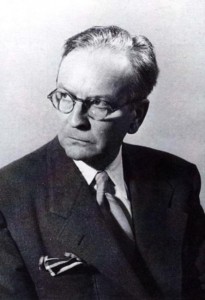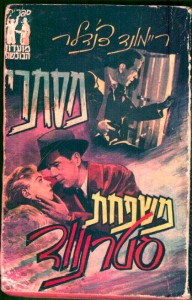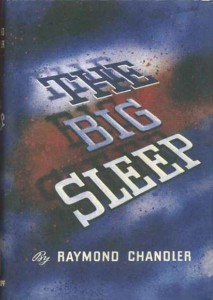Friday, July 25: Bandersnatches
WHEN I’M SIXTY-FOUR
by Steve Steinbock
This week’s column marks my sixty-fourth installment of Bandersnatches. The number sixty-four may have numerological significance. I don’t know. But I’ve been listening to the Beatles, so I figure it’s as good an excuse as anything to celebrate.
Earlier this week, my High-Heeled colleague played an experiment by invoking Jane Austen and Raymond Chandler as muses and imaginary editorial consultants. It was a fun column. Judging from the huge number of comments, it’s clear that I’m not the only person who thought so.
Like Melodie, and like many mystery professionals, I found great pleasure and inspiration from reading the works — and the journals — of Raymond Chandler. How I came to Chandler, and through him, mysteries, is an interesting story.
 The other day, my well-tuned colleague Rob mentioned a few physical locations at which he’d found inspiration to write certain stories. I can tell you the exact city and year that I discovered Chandler and became a mystery devotee. It was 1982 in the city of Jerusalem. If I had to pick an exact spot, it would be an off-the-beaten-track bookshop qua coffee house down an alley off Ben Yehudah Street, and up a staircase. The place was somewhat hidden, and unless you knew it was there, you’d never know it was there. The name of the place, appropriately enough, was Sefer V’Sefel, which is Hebrew for Book and Mug.
The other day, my well-tuned colleague Rob mentioned a few physical locations at which he’d found inspiration to write certain stories. I can tell you the exact city and year that I discovered Chandler and became a mystery devotee. It was 1982 in the city of Jerusalem. If I had to pick an exact spot, it would be an off-the-beaten-track bookshop qua coffee house down an alley off Ben Yehudah Street, and up a staircase. The place was somewhat hidden, and unless you knew it was there, you’d never know it was there. The name of the place, appropriately enough, was Sefer V’Sefel, which is Hebrew for Book and Mug.
 I was living in Jerusalem, attending graduate school. The curriculum was almost entirely one of translating ancient texts, which came fairly easy to me, and which freed me up to read more fiction — sheer pleasure reading — than I’d ever been afforded. I read some Hermann Hesse, some obscure novels of Aldous Huxley, Dostoyevsky’s Crime and Punishment, and yes, even some Jane Austen. I typically chose the kind of book that educated people are supposed to have read. Much of it (specifically the authors and titles I just mentioned) I enjoyed.
I was living in Jerusalem, attending graduate school. The curriculum was almost entirely one of translating ancient texts, which came fairly easy to me, and which freed me up to read more fiction — sheer pleasure reading — than I’d ever been afforded. I read some Hermann Hesse, some obscure novels of Aldous Huxley, Dostoyevsky’s Crime and Punishment, and yes, even some Jane Austen. I typically chose the kind of book that educated people are supposed to have read. Much of it (specifically the authors and titles I just mentioned) I enjoyed.
But unfortunately, a lot of the books that I was supposed to love simply left me cold. I was trying to read books by Lillian Hellman, Albert Camus, John Irving, and Joan Didion, but I wasn’t enjoying them. Even Robert Heinlein’s Stranger in a Strange Land — about which numerous friends told me would “change your life, man” — failed to live up to its reputation. (I admit that I liked the concept of grok, which Heinlein introduced in that novel).
 Then one day a classmate with whom I’d been sharing an apartment (he’s a rabbi in Illinois, now) suggested I read Raymond Chandler. I’m fairly certain that the first of his book that I read was The Big Sleep (although it might have been Farewell, My Lovely). It changed the way I thought of literature.
Then one day a classmate with whom I’d been sharing an apartment (he’s a rabbi in Illinois, now) suggested I read Raymond Chandler. I’m fairly certain that the first of his book that I read was The Big Sleep (although it might have been Farewell, My Lovely). It changed the way I thought of literature.
This book actually had a plot. It had a clear beginning, middle, and end. It had action that flowed forward. And it was beautifully written. Chandler’s similes are unsurpassed. They were outrageous, but always fitting. (Among my favorites is the description of Moose Malloy at the opening of Farewell, My Lovely: “He was a big man but not more than six feet five inches tall and not wider than a beer truck.” It’s outrageous enough to make me chortle every time, and yet the image of a beer truck is so appropriate to Moose.)
 There are little things in The Big Sleep that indicated to me that in spite of how much fun I was having reading it, and despite the brevity of the novel, it truly was literary. This was quality, intelligent writing. The description of the painting of the tarnished knight that Marlowe sees when he first enters the Sternwood mansion is evocative and elegant. Marlowe’s reaction when Carmen throws herself at him (chapter 24) is surprising, and shows a morality that is complex and conflicted. Brilliant writing, and I don’t care who killed the chauffeur.
There are little things in The Big Sleep that indicated to me that in spite of how much fun I was having reading it, and despite the brevity of the novel, it truly was literary. This was quality, intelligent writing. The description of the painting of the tarnished knight that Marlowe sees when he first enters the Sternwood mansion is evocative and elegant. Marlowe’s reaction when Carmen throws herself at him (chapter 24) is surprising, and shows a morality that is complex and conflicted. Brilliant writing, and I don’t care who killed the chauffeur.
Over the years I’ve read all Chandler’s novels at least twice, revisiting the first two every year or so. I never tire of them. I think it’s the anthology Killer in the Rain that contains the short stories Chandler “cannibalized” to create three or four of his novels. Reading those stories and seeing how he incorporated them into the Marlowe novels was as exciting as it was instructional.
Would I want to have spent time with Chandler? I don’t know. He was certainly an odd duck. His neuroses rivaled Michael Jackson’s. His attitudes toward women and sex was stunted and strange. His depression and his drinking habits would put a test on any friendship.
But he could sure write. Everything a well-dressed detective writer ought to be as he now sleeps the big sleep.




















Nice piece.
Seems to be a lot of Chandlery going on lately.
His attitudes toward women and sex was stunted and strange.
Strange, maybe. Stunted, no. I think Chandler’s attitude to woman was simply old fashioned. He grew up in the tail end of the Victorian era – he was (for a time) living in England while Oscar Wilde was still a name to inspire confidence. Chandler respected woman, he had a chivalrous attitude regarding them – Dulwich boys were raised to be gentle knights. Chandler was also shy.
Just my 5c comment.
By the way, did anyone raise a glass on Wednesday last (RTC’s birthday)?
By “stunted” I was thinking of how attached he seems to have been to his mother, and how after his mother’s death, he so quickly married Cissy, who was nearly old enough to be his mother.
But I agree that “shy” and “chivalrous” are both words that fit him.
Didn’t he have a thing about wearing gloves? (That’s what made me associate him with Michael Jackson). I don’t remember if it was fear of germs or just shyness. Some Chandler scholar out there can clarify, or correct me if I’m wrong.
Good column, and one I especially enjoyed for reasons that Steven knows but must remain mysterious for a few weeks (evil cackle). Last year I wrote about the moment when you became a mystery fan. For me it was reading “they were the footprints of a gigantic hound.”
I am absolutely embarassed to admit that Heinlein’s Stranger in a Strange Land changed my life more than any religious book I have ever read.
Y’know, I’ve found that “this book will change your life” is the kiss of death. Life-changing media are non-transferable.
In recent years, a book that was transformational for me was Orson Scott Card’s Speaker for the Dead. I found it brilliant, and also found that the insights were precisely what I needed at that moment in my life. I’d recommend it, but I’d never suggest that it would change anyone else’s life.
Hey, y’all like my Hebrew copy of The Big Sleep? I picked that up in the very bookshop/cafe I mentioned.
Rob, I can’t wait to hear of your adventures!
>Hey, y’all like my Hebrew copy of The Big Sleep?
Goyim chasing gonifs and shlemiels? Oy!
Hey, y’all like my Hebrew copy of The Big Sleep?….
yes, and that you used “y’all”!
There is an opinion piece in the WSJ today by a mystery writer who has won several awards…but it is political so I’m not sure I should post the link, but I read it first because I noticed his rep and 2ndly because I found the piece captivating. His name is Andrew Klavan.
Lastly, I am helping clean out an older profs office and he had some personal reading material and I found a book of 5 stories by Mickey Spillane, so I confiscated it for the weekend to read. I can’t believe I never read my mother’s collection.
I enjoyed reading your article.
Hi Steve,
He was very protective of his mother. She was always good to him and he was repaying kind. There was also a louse father whose memory hung large. The gloves were for a skin condition, not a germ phobia.
When Chandler was living in LaJolla, California in his last years, one of his drinking buddies was an up-and-coming writer named Ted, who we know as Dr. Seuss!
Stephen Ross, thanks for clarifying, particularly about the skin condition. It was hard mentioning one of my heroes in the same sentence as Michael Jackson.
Alisa, I’ll look up the WSJ piece. Regarding my use of “y’all,” I came to appreciate it during the four years I lived in southern Virginia. I regret that in modern standard English we no longer distinguish between 2nd person plural and 2nd person singular. (I know that in some regions, “y’all” is used as a singular, but never by me).